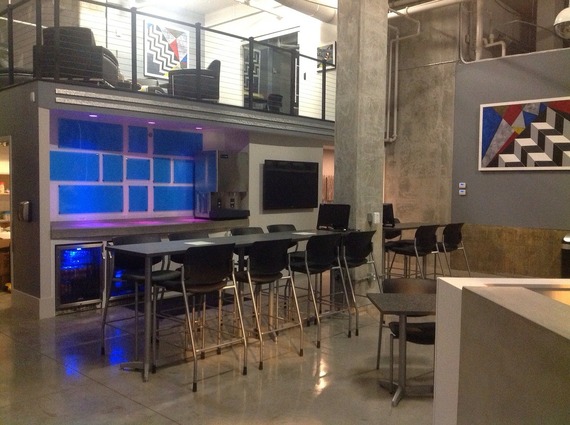Co-Working Defined
Technological advances have given employees more independence and mobility to work from nearly any location at any time. Large and small employers are permitting and even encouraging their employees to work from out of office. This growing trend has even birthed a new niche market -- co-working -- as more entrepreneurs and traditional workers, needing only Internet connection, choose to live alternative lifestyles which let them dictate their location and hours.
An article in Harvard Business Review titled, "Workspaces That Move People" describes the origin of co-working as coming from San Francisco, Berlin, and London in 2005. "Technologists, programmers, and creative professionals wanted to work outside confining office environments but also to avoid the isolation of home offices," wrote its authors. What they formed is now called co-working.
What is Co-Working Like and Who Uses It?
One Wild Life (OWL) is one of a growing number of static and mobile start-ups catering to this specialized market. "We started One Wild Life to enable people to enhance their professional lives by working in inspiring places and creating a healthy work-life balance," writes co-founders Tim Stempel and Ryan Woldt on their funding website.
Operating out of San Diego, California, the OWL founders foresee servicing a variety of mobile professionals. "We service self-employed freelancers and entrepreneurs with an adventurous streak who want to be able to get out and surf, hike or bike before, after and during work," Woldt explains, adding that other clients might include "those who are excited about a new way of working or are just looking for an alternative to the coffee shop and want to be surrounded and inspired by other adventurous spirits."
Their Adventure Lab, a repurposed school bus turned co-working space, caters to eight to 12 clients and is outfitted with a technically integrated workspace including Wifi, desk space, conference and presentation space, video projection, and of course good coffee.
Providing customers a variety of mobile packages, including multi-day passes for outside activities like biking, surfing, hiking, or yoga, gives them freedom to literally choose the road less traveled and enjoy it -- all while being location independent. "Because we're in a mobile facility we can be flexible with our location to avoid falling into routine," Woldt says.
The founders anticipate launching the Adventure Lab in late August or early September, but have big dreams to create multiple mobile co-working units on a national and international level.
Are Co-Working Spaces Becoming the New Normal?
More freelancers and contractors are favoring working out of office for reasons such as more family time, less stress, overall improved happiness and improved productivity when compared to traditional office work. Some estimates predict freelancers and contractors will comprise 40 percent of the workforce by 2020.
"People are valuing work style and sense of community over traditional careers, and co-working is a flexible and affordable solution for them," says Zoltan Szalas, Co-founder at Croissant and named one of the 30 Most Influential People in Co-working in 2016.
Laurie Davis, founder and CEO of eFlirt, uses different co-working spaces depending on her location. Davis uses Croissant when in New York City and One Roof when in Los Angeles. She describes a co-working environment as being quite adaptable to her business needs.
"We are inspired by environment, so we love most about Croissant is that we have several co-working spaces to choose from depending upon the vibe we'd prefer that day," Davis says. "Some are quieter which can be better for brainstorming while others are more conducive to networking if we'd like to meet new prospects and brand partners. It never feels like "going to the office" when you're not showing up to the same space each day."
Co-working is not just growing in popularity among employees. For employers, working remotely has several added benefits.
Aside from letting companies and entrepreneurs decrease their overall expenses, rent, and overall carbon footprint, co-working further helps firms fill tough job vacancies because they can expand their candidate pool from a local level to national or even international level.
"Economic uncertainty and an emphasis on employee experience are driving companies to turn to co-working as a solution to cut real estate costs and to provide a more fulfilling work experience for employees," Szalas says.
Evidence of this real estate trend is visible. "[W]e're focused on the intersection of people and workplace. We see this revolution as "The Great Era of Unbuilding," Liquidspace founder Mark Gilbreath penned in 2012 for Shareable. "We are going to eat into the vast supply of existing buildings, bringing them back to life serving the needs of one billion mobile workers, who make powerful decisions in real-time about how, where and with whom they want to work," he added.
The co-working, location independent mentality is moving from the fringe of society to front-and-center and now includes cities like San Francisco, New York, London, Tokyo, and Shanghai. This movement is also strong in rebuilding cities like Detroit which show the kind of communal impact co-working has on the micro-level.
Whether working from a mobile or static co-working space, one thing is clear: more companies and entrepreneurs are willingly shifting to operate in this manner instead of traditional office space.
Future Outlook
As for the future of co-working, Szalas predicts one based on collaboration. "We are entering a new age of workplace, where corporate employees, freelancers, and entrepreneurs will work side-by-side in a collaborative and community driven environment," he says, adding that "it will open up opportunities for innovation, provide freelancers with jobs, and entrepreneurs with more opportunities."
"In essence," Szalas notes, "co-working is breaking down the traditional corporate barrier that existed for years and bringing smart people with different work styles together."

